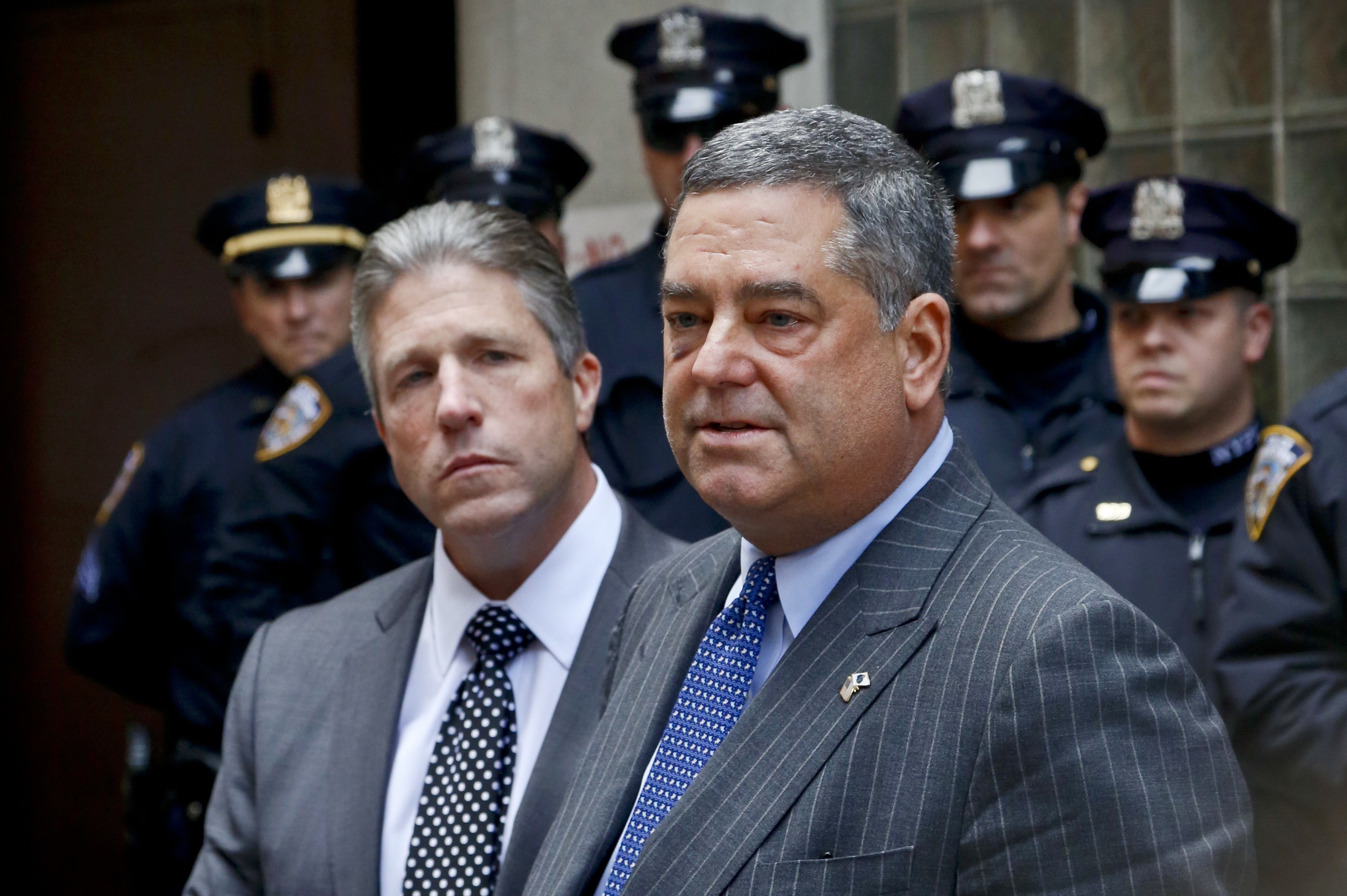





Patrick Lynch, president of the Patrolmen's Benevolent Association, left, and NYPD Deputy Commissioner for Legal Matters Lawrence Byrne at a news conference in 2016. The union plans to endorse candidates in about a dozen City Council races. PHOTO: BEBETO MATTHEWS/ASSOCIATED PRESS
For nearly four years, the country’s largest police union has looked on at the New York City Council and often fumed.
Mayor Bill de Blasio’s rocky relationship with the police has drawn more attention. But in the eyes of the Patrolmen’s Benevolent Association, the City Council has been a problem as well, with lawmakers taking up several high-profile bills in recent years scrutinizing officers and the work they do.
Now, with most of the 51 lawmakers up for re-election this year, the police union is seizing on a chance to do something about it.
The Patrolmen’s Benevolent Association, or PBA, plans to play big in this year’s City Council races, spending hundreds of thousands of dollars on campaign ads in the hopes of reshaping the City Council to make it friendlier to its 24,000 police officers and some 25,000 retirees.
“We need to have a city council that will speak up, defend New York City police officers, and dig into the issues so that they understand them,” PBA President Patrick Lynch said in a phone interview. “We also need them to stand up to the [de Blasio] administration and speak up on behalf of police officers as allies.”
The union plans to endorse candidates in about a dozen City Council races.
In East Harlem, the union plans to back state Assemblyman Robert Rodriguez, a Democrat running for the seat being vacated by City Council Speaker Melissa Mark-Viverito, who is term-limited. In Queens, it will endorse Councilwoman Elizabeth Crowley, a Queens Democrat. In Brooklyn it plans to endorse Félix Ortiz, a state assemblyman and Democrat hoping to unseat Councilman Carlos Menchaca, also a Democrat.
In some cases, the union is targeting lawmakers it sees as openly hostile to police. Mr. Menchaca, for example, has supported legislation the PBA views as hostile, and has declined to meet with union officials, according to advisers familiar with the PBA campaign.
Mr. Menchaca didn’t immediately respond to a request for comment.
In recent years the City Council, one of the most unabashedly liberal groups of lawmakers the city has seen in decades, has introduced legislation curbing police powers.
One council bill would have made the use of chokeholds by officers, already banned, a misdemeanor crime. Another sought to require officers to obtain consent before conducting a street stop without probable cause. Still another would have forced officers to give their name, rank and command to anyone they stop when the encounter doesn’t result in an arrest or summons. The bills were ultimately tabled, though some measures were adopted administratively.
Mr. Lynch said the legislative efforts to constrain police were unreasonable.
Councilman Rory Lancman, who sponsored the bill to criminalize chokeholds, said he isn’t antipolice. “All of us who support police reform bills have been very clear about respecting and appreciating what police officers do for us while desiring to change broader policing policies,” he said.
Such legislation isn’t the union’s only beef. The union’s feud with Mr. de Blasio and the City Council in recent years has unfolded against the backdrop of tense and protracted labor contract negotiations.
The police union has for years sought higher pay, arguing that salaries for NYPD officers are low when compared with officers in the surrounding suburbs. The starting salary for NYPD officers is $42,500; for the New York state troopers working in New York City, it is $67,083, a difference PBA officials say is unfair and makes it harder to attract talented recruits.
“We’ve changed the city, we’re keeping the city in good shape, and then we don’t get the support that we need,” Mr. Lynch said.
A spokeswoman for Mr. de Blasio didn’t respond to a request for comment.
The PBA leadership has also long sought increased disability benefits for injured officers. When they didn’t win that concession from the city, they got it in a deal signed by New York Gov. Andrew Cuomo this month instead. The state agreement will cost New York City an estimated $54 million over five years, according to an estimate by the nonpartisan Citizens Budget Commission.
The PBA’s City Council blitz is the latest campaign by a union that has played an outsize role in New York City politics for years. The union staged a rally against Mayor David Dinkins in 1992, protested Mayor Rudy Giuliani during a 2001 labor dispute and meted out the same treatment to Mayor Michael Bloomberg, picketing his Upper East Side townhouse during 2004 contract negotiations. The union has frequently used the specter of rising crime as a negotiating tactic, often with fruitful results.
“Ask anybody, ‘Do you want to be protested by the PBA?’ The answer is no,” said Ed Skyler, who served as a deputy mayor under Mr. Bloomberg, and helped negotiate a labor contract with the group.
Mr. Skyler said the union’s political power has endured as the city has enjoyed economic gains thanks in part to a dramatic decrease in crime over the past two decades. “They’re a very, very powerful and influential union,” he said.
The labor contract the de Blasio administration reached with the police union earlier this year expires July 31. Both sides are set to be at the negotiating table this summer.